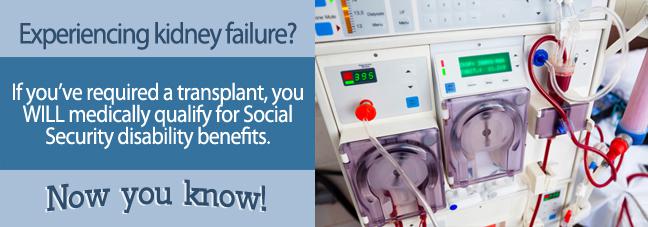If you have been told you are suffering from kidney disease it has to be severe if you wish to be eligible to receive a disability benefit. According to the Social Security Administration (SSA) there are hundreds of conditions that qualify for disability benefits, but an applicant must remember when diagnosed with kidney disease the condition must be severe if he or she wishes to qualify for disability benefits. This means the kidney disease will stop you from working for at least 12 months and you will need to provide sufficient evidence that proves you are unable to work for at least this period.
Blue Book Listing
The symptoms caused by kidney disease that are likely to affect your daily life may include any combination of the following:
- Nausea/vomiting
- loss of appetite
- shortness of breath
- swelling of the feet and ankles
- itchy, dry skin
- muscle cramps
- trouble sleeping
- urinating either too much or too little
Kidney disease is covered in Section 6.00 of the Blue Book under Genitourinary Disorders. The SSA must find at least one of the following conditions to be true in order to classify your kidney disease as a disability:
- You require dialysis due to kidney disease.
- You recently underwent a kidney transplant due to kidney illness.
- At least one of the following describes your kidney illness, which has reduced kidney function:
- Renal osteodystrophy, kidney failure-related bone disease characterized by significant bone pain and deformities.
- You have nephrotic syndrome (when protein is lost in urine), which appears in tests twice within a calendar year, at least 90 days apart, and with skin swelling lasting at least 90 days.
- You have been in hospital at least three times in 12 and the hospitalizations must take place 30 or more days apart and must last for 48 hours
A blood test is the primary examination for kidney disease. The test gauges your blood's levels of creatinine, a waste product. Your doctor determines how much waste your kidneys should be able to filter in a minute using the results of your blood test along with information about your age, size, gender, and ethnicity.

Applying for a Disability Benefit
Applying for disability benefits is never easy as 2/3 of initial applications are denied. This may be due to technical problems with an application or disqualification based on unsuitable medical information. However, working with an attorney can help you understand the SSA’s designated conditions and related medical requirements and what your status is regarding those with kidney disease.
How a Disabling Medical Condition May Affect You and Your Family
One of the key problems that take place after being diagnosed with a serious medical condition like kidney disease is that it is difficult for you and your family to bear the consequences of the diagnosis for several reasons such as:
- being in a constant state of financial stress
- experiencing too much stress due to your disability and the financial costs it entails
- not being able to do just basic life tasks independently
- suffering physically and mentally because of the kidney disease
- not being able to engage in activities that once brought you joy
- not being able to provide a sufficient income for your family
Next Steps
It is never easy to win a claim for a disability benefit for kidney disease but asking for help from an attorney will help to ensure you have completed the application form fully and you have provided sufficient medical evidence which proves you are unable to work for at least 12 months due to your diagnosis of kidney diagnosis. You can help yourself today by submitting a free case evaluation today.